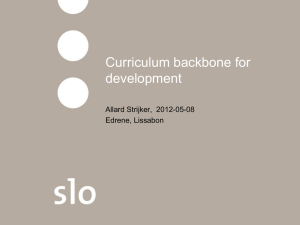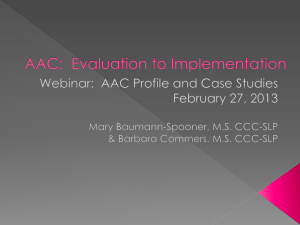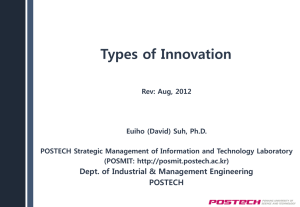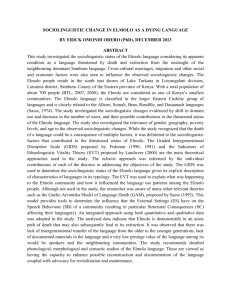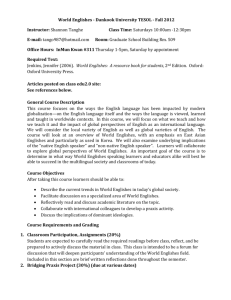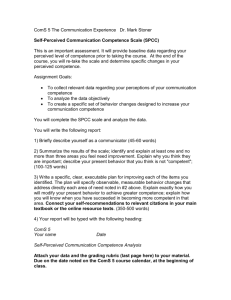NATOSpeak, Communication, Culture and Cultural Literacy
advertisement
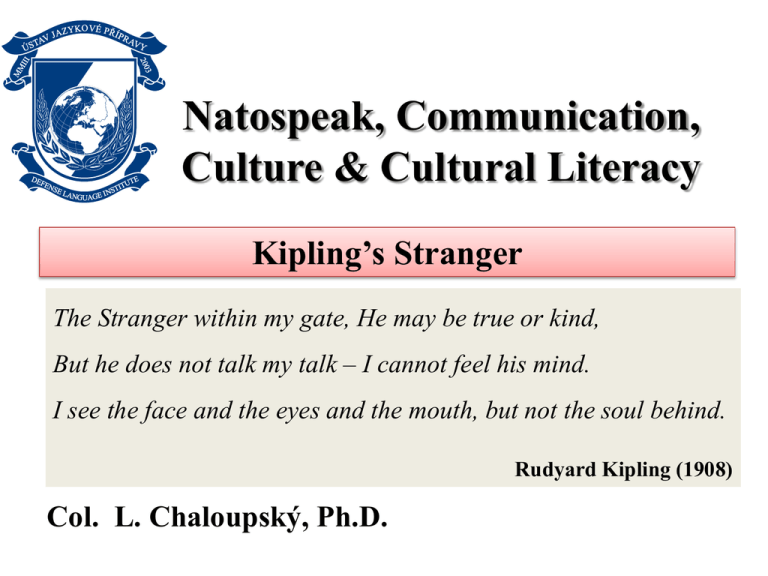
Natospeak, Communication, Culture & Cultural Literacy Kipling’s Stranger The Stranger within my gate, He may be true or kind, But he does not talk my talk – I cannot feel his mind. I see the face and the eyes and the mouth, but not the soul behind. Rudyard Kipling (1908) Col. L. Chaloupský, Ph.D. Charge of the LB Trooping of Battle Honours Elements of Cultural Communicative Competence and Possible Complications PRODUCTION COMPREHENSION Grammatical Competence Semantics/ Pragmatics Polysemy/ Homonymy Morphology Sociolinguistic Competence CULTURAL COMPETENCE Phonology Functional Competence Synonymy/ Antonymy Syntax Speech Acts Lexicon Interactional Competence Cultural Speech Area Czech • Rukulíbám, milostivá paní. German • Küs´die Hand, gnädige Frau! English American English British English • I kiss your hand, gracious lady. Australian English N.Zealand English Cultural Speech Areas Native to Non-Native THE CHINESE PILOT TO ATC VIDEO Components of Speech Events S P E A K I N G S SITUATION Physical, temporal, psychological setting defining the speech event P PARTICIPANTS Speaker, hearer, addressee, audience E ENDS Purposes, goals and outcomes A ACT OF SEQUENCE Message form and content K KEY Manner of speaking, tone (serious, tentative…) I INSTRUMENTALITIES Spoken or written, use of dialects, register N NORMS OF INTERACTION Turn -taking, interpretation (local conventions of understanding G GENRE Casual speech, accademic essay, etc. Different Englishes Non-native Englishes Czenglish Deutschglish/ Gerlish Italglish/ Italish Frenglish/ Franglais Johnsonese Academese, bureaucratese Brooklenese ´Si vous êtes un first-time reader de Franglais, welcome! Franglais est comparativement painless et ne donne pas un hangover. En quantités judicieuses, il est mindblowing. Ayez fun.´ Different Englishes Institutionalized Unglish/ UNese EUglish Natoglish Pentagonese/ MoDese “Uh, sir, we’re not sure which of these is the latest version – we’ll de-conflict and have this fixed for the next meeting.” “We don’t have time to talk about this crap – we’ve got a tight, intense battle rhythm and we’ve got to get through these slides if we want to stay on track.” Seaspeak Airspeak Natospeak Seaspeak Examples This is HMS ‘Dartmouth’ Seaspeak (English for Maritime Communications) is the English of merchant shipping, a restricted language adopted in 1988 by the International Maritime Organization (IMO) of the United Nations. Airspeak Examples Air Traffic Controller: Pilot: "Identing, BA six zero six Alfa." "BA six zero six Alfa: squawk ident." (In the above: squawk means "reveal", ident means "identify," and identing means "identifying.") Airspeak (Air Traffic Control English, Aviation English) is the English of international civil aviation, a restricted language established after the Second World War by the International Civil Aviation Organization (ICAO) of the United Nations. Natospeak NATO - MILITARY ARMY NAVY AIR FORCE Special Forces NCO´s Officers Generals Airspeak Natospeak = Seaspeak OR ESP ? Plus other speaks ? English for Specific Purposes (ESP) is the English language taught for professional, vocational, and other specific purposes. ESP addresses learners with a common reason for learning, such as the English of air traffic control or Operational Mentor and Liaison Team (OMLT). Misson Area Canada Great Britain USA C U L T U R E Australia IMPACT New Zealand Pronunciation, Dialects, Intonation, Speed of Speech, Vocabulary, Grammar, Spelling, 30 Different Non Native English Speakers Ireland India, South Africa, East Africa … Different Cultures And when people are entering upon a war they do things the wrong way around. Action comes first, and it is only when they have already suffered that they begin to think. Thucydides, The Peloponnesian War Culture and its Characteristics • Culture is a system of shared beliefs, values, customs, behaviors, and artifacts that the members of society use to cope with their world and with one another. • Culture is learned, though a process called enculturation. • Culture is shared by members of a society; there is no “culture of one.” • Culture is patterned, meaning that people in a society live and think in ways that form definite, repeating patterns. • Culture is changeable, meaning it is constantly changing through social interactions between people and groups. • Culture is arbitrary, meaning that Soldiers and Marines should make no assumptions regarding what a society considers right and wrong, good and bad. • Culture is internalized, in the sense that is habitual, taken-for-granted, and perceived as “natural” by people within the society. James Cook Kipling’s Stranger The Stranger within my gate, He may be true or kind, But he does not talk my talk— I cannot feel his mind. I see the face and the eyes and the mouth, But not the soul behind. The men of my own stock, They may do ill or well, But they tell the lies I am wonted to, They are used to the lies I tell; And we do not need interpreters When we go to buy or sell. CONCLUSIONS • PURPOSE OF STANAG 6001 NEED TO BE UNDERSTOOD PROPERLY (proficiency type of test not an achievement type of test, not a university type of exam, etc.) • STANAG 6001 DESCRIPTORS NEED TO BE RIGOROUSLY ENFORCED • Culture should be incorporated into language training at all levels • A lack of Cultural Awareness, Cultural Recognition & Independent Research into the nuances of operating in English will endanger coalition missions • While there are obvious sensitivities involved, the attitude that this cannot be looked at because it is "political" or "cultural" is not helpful needs to be overcome • Any nonchalant attitude to the consequences of failing to address training and education requirements will reduce and negate the roles of individual members within the Alliance THANK YOU FOR YOUR ATTENTION Questions Are Welcomed BIBLIOGRAPHY • • • • • • • • • • • • • • Hymes 1968 – Linguistic problems in defining the concept of ´tribe´ McArthur – The Oxford Companion to the English Language Hall, Smith, Wicaksono - Mapping Apllied Linguistics Chaloupský, McKeating – Theories in Practice, Military Language and Culture, Zlín Chaloupský - A Sociolinguistic Interpretation of Military Slang and Vernacular Expressions, Brno Holmes – An Introduction to Sociolinguistics http://www.jftc.nato.int/JFTC%20Magazine3/index.html http://en.wikipedia.org/wiki/Afghanistan http://www.wired.com/dangerroom/2011/02/pentagonese-a-primer/ http://www.un.org/en/events/englishlanguageday/translators.shtml http://en.wikipedia.org/wiki/Seaspeak http://punch.photoshelter.com/image/I0000a9.bKUAOPPQ http://www.timeanddate.com/holidays/australia/anzac-day http://www.staff.amu.edu.pl/~inveling/pdf/liu_quingxue_inve9.pdf


